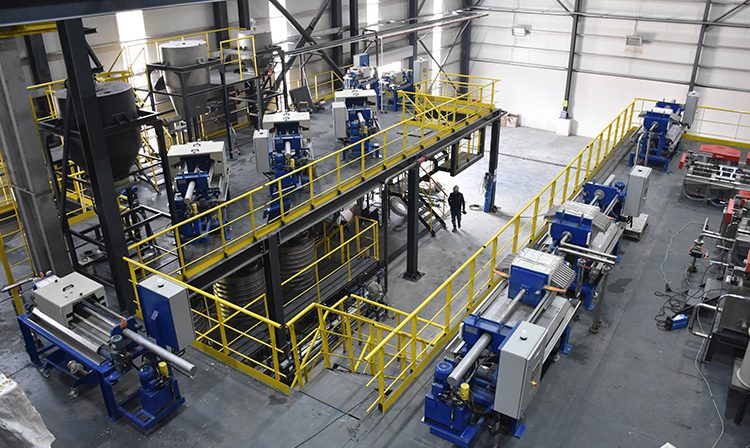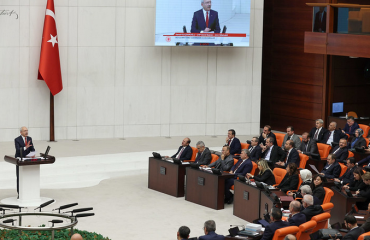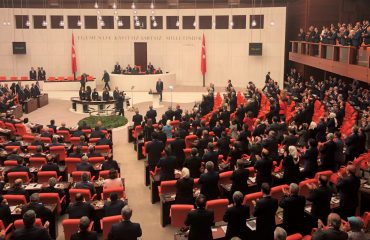

The pilot Rare Earth Elements (REE) processing plant in Beylikova district of Eskişehir Türkiye. The strategic minerals discovered in Eskişehir may have a potential in contributing technological development in the country. The REE may also become a topic of discussion in Türkiye’s relations with China and the US.
Foreign Minister Hakan Fidan’s visit to China from June 3-5 encompassed not only political discussions on issues such as Palestine, Uyghur Turks, and Taiwan but also aimed to elevate trade and economic relations between the two countries to a strategic level. Prominent topics included energy investments and transportation projects, particularly the Asia-Europe Belt and Road Initiative’s passage through the Caspian Sea via Türkiye.
Minister of Energy and Natural Resources Alparslan Bayraktar’s meeting with Chinese Minister of Natural Resources Wang Guanghua in Beijing on May 21, further highlighted new opportunities in bilateral relations. Among these new opportunities are strategic minerals.
Bayraktar has already announced this meeting on his “X” account as enhancing cooperation “in the fields of natural resources and mining, especially critical minerals and rare earth elements”.
Critical minerals and rare earth elements refer to strategic minerals that are vital in digital technology and clean energy production.
Strategic minerals, Rare Earth Elements
Rare earth elements (REEs) are used in small quantities, but are integral to our daily lives. Your smartphone, for instance, probably contains more than ten REEs. You can’t make touchscreens without indium, phone batteries without lithium and cobalt. Without gadolinium, you can’t use the microphone and speaker in your pocket, and without neomidium, you can’t use vibration. From medicine to the defense industry, REE mines are of increasing strategic importance.
In 2023, China produced nearly 70 percent (68.6 percent) of the world’s REEs, while the USA, the second-largest producer, accounted for 12.3 percent, almost one-fifth of China. However, when it comes to REE deposits, China is the clear leader with estimated reserves of 44 million tons, followed by Vietnam with 22 million tons, Brazil with 21 million tons, Russia with 10 million tons and India with 7 million tons. The reason why China is ahead of the other countries in terms of production is that its extensive refining capacity. The majority of REE refineries are located in China; China is the market leader in REE.
Cheap labor is not the sole reason why over 90 percent of US brand Apple’s products, including iPhones, are manufactured in China (and to a lesser extent in Vietnam and India).
Strategic mines in Eskisehir
The REE deposits discovered by Eti Maden near the Beylikova district of Eskişehir could enable Türkiye to produce new technologies in a short time without the need for imports. According to Ministry of Energy sources, Beylikova has the world’s second largest single REE deposit after the Obo deposits in China, with a raw capacity of 694 million tons. The sources say that 17 REEs used in industry are found in Beylikova, 10 of which are in a processable state.
Shortly before the 2023 elections, President Tayyip Erdoğan opened the first pilot REE plant in Beylikova on April 18, 2023 to produce barite and fluorite. The Beylikova site also reportedly contains thorium deposits, which could replace uranium in nuclear power plants, and magnesite deposits, which are also used in the defense industry.
In order to acquire the necessary technology to process these minerals domestically, Türkiye’s engagement with China and the US, which are competing fiercely in this field, is crucial.
China-US competition
In fact, Russia also has advanced REE technology. However, the Ukraine war is hampering developments in this field as well.
About two weeks before his trip to China, Energy Minister Bayraktar was in the US on May 8-9. In addition to meetings with US Energy Secretary Jennifer Granholm, Bayraktar attended the signing ceremony of an agreement between BOTAŞ and Exxon for Türkiye to purchase up to 2.5 million tons of liquefied natural gas (LNG) each year for 10 years.
Another rivalry between China and the US is over the construction of mini nuclear power plants, known as “modular” plants. The UK is also in the running to build one of these plants in Türkiye.
Returning to the topic at hand, the rare earth element deposits found in Eskisehir are a development that, if properly processed, could support Türkiye’s technological leaps in certain strategic areas.
Foreign Minister Fidan’s contacts with China may also have consequences in terms of warming up and advancing the contacts of Energy Minister Bayraktar.


